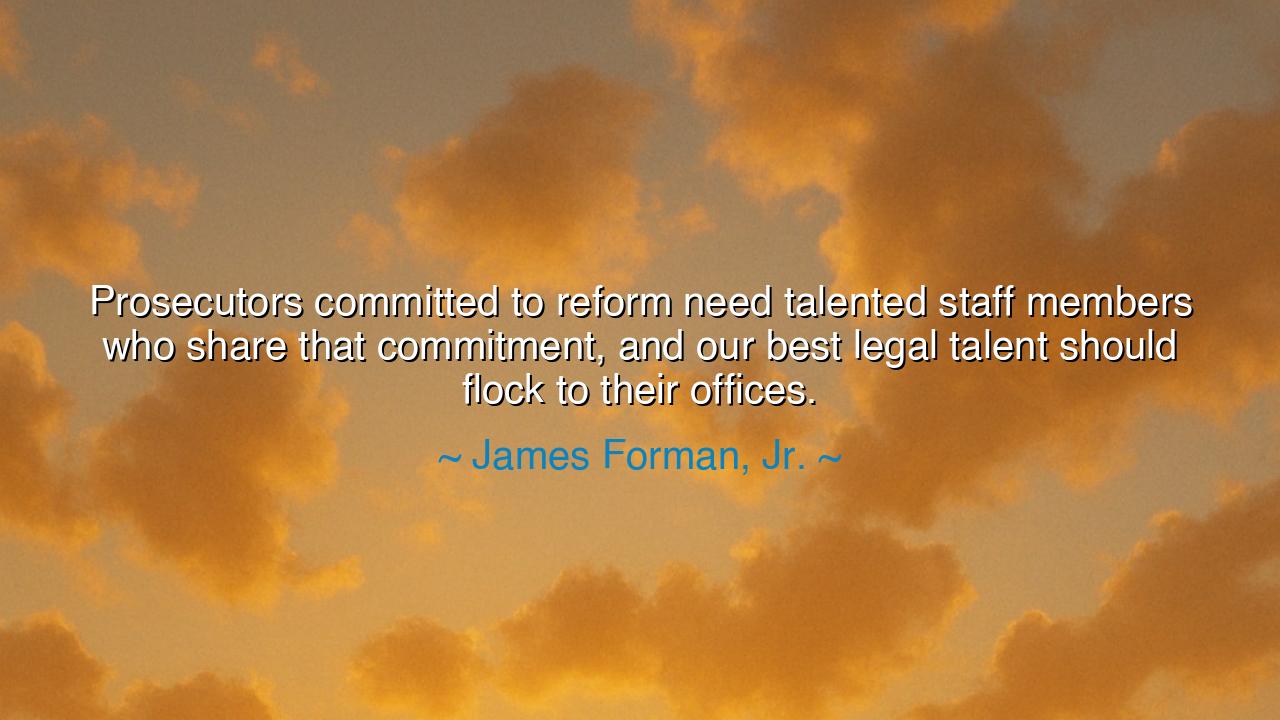
Prosecutors committed to reform need talented staff members who
Prosecutors committed to reform need talented staff members who share that commitment, and our best legal talent should flock to their offices.






The words of James Forman, Jr. carry both urgency and idealism: “Prosecutors committed to reform need talented staff members who share that commitment, and our best legal talent should flock to their offices.” These are not the words of comfort, but of challenge — a call to those who hold power within the realm of justice to use it not as a weapon, but as a means of healing. In these words, Forman reminds us that the law, for all its grandeur, is only as righteous as the people who wield it. True reform cannot be born from systems alone; it must flow from hearts awakened by compassion and courage.
From the beginning of civilization, the lawgiver has stood as one of the most sacred figures — one who shapes not only the rules of the land but the moral architecture of the soul. Yet throughout history, the law has often been bent by fear, prejudice, and convenience. What Forman demands is a renewal of spirit — that those who serve within the halls of justice must also serve within the temple of conscience. For a prosecutor, who holds the power to take away a person’s freedom, bears not only legal authority but moral responsibility. Such a role demands the finest minds and the purest intentions.
Forman’s message rises from the heart of modern struggle. In a time when mass incarceration and systemic inequality scar the justice system, he urges that change must begin not from protest alone, but from participation — that talented lawyers, the brightest and most capable, must not seek prestige in ivory towers or private wealth, but must enter the very institutions that shape the fate of the powerless. Reform, he teaches, is not the cry of the outsider alone; it is also the duty of the insider who dares to stand against the inertia of tradition.
There is a story from the life of Robert F. Kennedy, who, as Attorney General in the 1960s, sought to root out corruption and injustice within his own government. He called upon young lawyers, idealists fresh from the nation’s law schools, to join him — not for riches or glory, but to cleanse the system from within. Many answered that call, and though their victories were imperfect and incomplete, they proved that talent aligned with virtue could move even the heaviest machinery of law toward fairness. It is this same spirit that Forman invokes: the belief that the strength of justice depends not on its institutions, but on the moral integrity of those who inhabit them.
To reform the system, one must first refuse indifference. Too many of the gifted turn away from public service, disheartened by the slow grind of bureaucracy or tempted by easier paths. But Forman’s words summon them back, urging that the calling of justice is a noble art, worthy of their brilliance. He reminds us that the law is not an abstract code; it is a living covenant between people — and when guided by the right hands, it can restore faith, dignity, and humanity to those it governs.
We must understand that prosecutorial reform is not about weakening justice, but about strengthening its purpose — to protect, not to destroy; to correct, not to crush. When prosecutors are guided by empathy rather than ego, by truth rather than ambition, the courts cease to be chambers of punishment and become instead arenas of redemption. But such transformation demands not only leaders, but followers — a generation of lawyers, clerks, and thinkers who choose service over status. That is the true meaning of “flocking to their offices.” It is not a migration of bodies, but of ideals.
Thus, the lesson is clear: justice cannot be reformed from afar. It must be reformed from within, by those who dare to enter its heart. To every student of law, to every seeker of purpose, let this be your calling: do not fear the imperfection of the system — enter it, challenge it, transform it. Bring your intellect, your compassion, your discipline, and your defiance. For every righteous mind that joins the cause, a piece of the old injustice dies.
And so, let these words of James Forman, Jr. endure as a timeless commandment: that the work of reform is not the duty of the few, but the destiny of the noble. The future of justice depends not on chance, but on choice — the choice of the wise to serve where the need is greatest. If the best among us answer that call, then one day the law will not only punish wrongs, but will also uplift the good, heal the broken, and stand as the truest reflection of our shared humanity.






AAdministratorAdministrator
Welcome, honored guests. Please leave a comment, we will respond soon